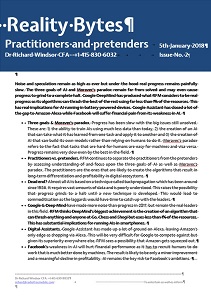RFM research subscribers will receive their copy directly by email.
Noise and speculation remain as high as ever but under the hood real progress remains painfully slow. The three goals of AI and Moravec’s paradox remain far from solved and may even cause progress to grind to a complete halt. Google DeepMind has produced what RFM considers to be real progress as its algorithms can thrash the best of the rest using far less than 1% of the resources. This has real implications for AI running in battery powered devices. Google Assistant has closed a lot of the gap to Amazon Alexa while Facebook will suffer financial pain from its weakness in AI.
- Three goals & Moravec’s paradox. Progress has been slow with the big issues still unsolved. These are: 1) the ability to train AIs using much less data than today, 2) the creation of an AI that can take what it has learned from one task and apply it to another and 3) the creation of AI that can build its own models rather than relying on humans to do it. Moravec’s paradox refers to the fact that tasks that are hard for humans are easy for machines and visa versa. Progress remains very slow even by the best in the field.
- Practitioners vs. pretenders. RFM continues to separate the practitioners from the pretenders by assessing understanding of and focus upon the three goals of AI as well as Moravec’s paradox. The practitioners are the ones that are likely to create the algorithms that result in long-term differentiation and profitability in digital ecosystems.
- Dead end? Almost all AI is based on a technique called backpropagation which has been around since 1986. It requires vast amounts of data and is poorly understood. This raises the possibility that progress grinds to a halt until a new technique is developed. This would lead to commoditisation as the laggards would have time to catch up with the leaders.
- Google & Deep Mind have made more noise than progress in 2017, but remain the real leaders in this field. RFM thinks DeepMind’s biggest achievement is the creation of an algorithm that can thrash anything and anyone at Go, Chess and Shogi but uses less than 1% of the resources. This has substantial implications for running AIs in smartphones.
- Digital Assistants. Google Assistant has made up a lot of ground on Alexa, leaving Amazon’s only edge as shopping via Alexa. This will be very difficult for Google to compete against but given its superiority everywhere else, RFM sees a possibility that Amazon gets squeezed out.
- Facebook’s weakness in AI will hurt financial performance as it has to recruit humans to do work that is much better done by machines. The result is likely to be only a minor improvement and a meaningful decline in profitability. AI remains the key risk to Facebook’s ambitions.









Research Publication – ...
11 September 2023